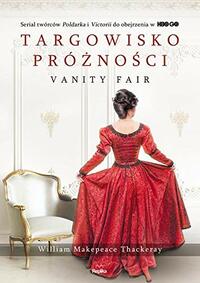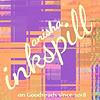Take a photo of a barcode or cover
A lot of people, even people who read classic novels, hate Vanity Fair. I have some theories as to why:
(1) It's a historical novel, making fun of the world of the past. Since the past in which it was written and the past it is talking about have merged into a single distant past for the most part, it is hard for us to pick out the details.
(2) When we approach a Classic Text, we sometimes bring along a sense of anticipatory reverence that makes it hard to recognize wit. Thackeray's elegant sentences are, as often as not, ironic, sardonic, parodic, or just generally wise-assed in nature.
(3) Although "Vanity Fair" is saturated with sex and sexuality, it is discreet enough that you can miss the juicy bits if you're not looking for them. I did, the first time through, despite being old enough to know better.
(4) Thackeray has no intention of giving you a character to identify with. The "good" characters are way too good, and dopey, to be very sympathetic. You WANT to like Becky Sharp -- I do, anyway -- but Thackeray teases us with her like you'd tease a cat with string. He lets her be what we want her to be -- the clever and resourceful woman who's so bad she's good -- and then periodically has her do something so nasty that we lose her. After a while, it will seem like she's mellowed, but he will snatch her away again and again. He is messing with us.
(5) Honestly, the back half really is a bit bloated. Some trimming in the post-Waterloo section wouldn't have hurt.
It's a 19th century sex comedy! It's about the various forms of human superficiality and humbuggery! What's not to love, outside of items 1-5, above?
Eye-read in the early aughts; ear-read in summer 2013.
(1) It's a historical novel, making fun of the world of the past. Since the past in which it was written and the past it is talking about have merged into a single distant past for the most part, it is hard for us to pick out the details.
(2) When we approach a Classic Text, we sometimes bring along a sense of anticipatory reverence that makes it hard to recognize wit. Thackeray's elegant sentences are, as often as not, ironic, sardonic, parodic, or just generally wise-assed in nature.
(3) Although "Vanity Fair" is saturated with sex and sexuality, it is discreet enough that you can miss the juicy bits if you're not looking for them. I did, the first time through, despite being old enough to know better.
(4) Thackeray has no intention of giving you a character to identify with. The "good" characters are way too good, and dopey, to be very sympathetic. You WANT to like Becky Sharp -- I do, anyway -- but Thackeray teases us with her like you'd tease a cat with string. He lets her be what we want her to be -- the clever and resourceful woman who's so bad she's good -- and then periodically has her do something so nasty that we lose her. After a while, it will seem like she's mellowed, but he will snatch her away again and again. He is messing with us.
(5) Honestly, the back half really is a bit bloated. Some trimming in the post-Waterloo section wouldn't have hurt.
It's a 19th century sex comedy! It's about the various forms of human superficiality and humbuggery! What's not to love, outside of items 1-5, above?
Eye-read in the early aughts; ear-read in summer 2013.
"At all events, if Rebecca was not beginning the world, she was beginning it over again."
I'm honestly not sure what to think about Vanity Fair. I can certainly appreciate the mastery of it, of the strength of Thackeray's structure and the story's depth, as well as his moral thread that weaves it all together. This superior sense of morality, however, is off-putting to me; Thackeray clearly thinks he knows better, and that ascendancy only worsens as he continually inserts himself into the narrative, particularly towards the end as he relates how he came to hear Rebecca and Amelia's stories.
I do understand that the reader is not meant to feel any sort of strong attachment to the characters as a principle part of that sense of morality; however, it's difficult to be motivated to make your way through a 900-page novel whose characters you don't particularly like. Even 'sweet, innocent' Amelia was insufferable to me at points.
That being said, Thackeray has subtitled this novel as one without a hero; arguably, I would say that a true hero does indeed emerge in the form of William Dobbin. He was the only character I consistently liked, and, again arguably, the only one with any real sense. He remains steadfast from beginning to end, while his fellow characters continue in their frivolous, flighty pursuits.
In reading a book this dense and this long, you come to expect a certain satisfaction upon reaching the end; the ending of this novel, however, left me unsatisfied.
Spoiler
Amelia and Dobbin's marriage and subsequent establishment at Hampshire was, of course, a deserved happy ending; my true unsatisfaction lies in Becky's fate. Thackeray really wants to tell me after everything she went through, scheming, plotting, and lying, that she settles in Bath still playing the injured widow? The Becky Sharp as I came to understand her deserves better than that. For all her faults, she is still of an admirable determination, and I would have far preferred the novel have left her disgraced and disillusioned with European society, standing on the bow of a ship headed to India or South America to challenge a new continent with her ambition and sheer will.
lighthearted
reflective
slow-paced
Plot or Character Driven:
A mix
Strong character development:
Yes
Loveable characters:
Complicated
Diverse cast of characters:
No
Flaws of characters a main focus:
Yes
Brevity is certainly not Thackeray’s forte. However, his innumerable inconsequential digressions are quite good at putting one to sleep if that is desired. The occasional laugh and scene of interest sustained me throughout the book’s 800 pages, the last few of which were quite touching.
funny
reflective
slow-paced
Plot or Character Driven:
A mix
Strong character development:
Complicated
Loveable characters:
Yes
Diverse cast of characters:
No
Flaws of characters a main focus:
Yes
Vanity Fair tells the story of the changing lives and loves of two women, Becky Sharp and Amelia Sedley.
I’ve been wanting to read this for some time and have the Oxford edition on Kindle but it’s over 1000 pages.
So, for now I’ve opted to listen to the abridged version, produced by Naxos and read by Jane Lapotaire.
It took a few chapters for me to discover this is a comedy, this was a surprise; I had missed the movie, starring Reese Witherspoon, released (I’m guessing) about a decade back, and just assumed this was a domestic drama, or maybe a romance – instead it has two female leads who are not always likeable or easy to empathise with but strong.
The 3 stars is for the abridged audiobook ,where at times the story’s flow seemed patchy (with parts missing), but listening to this was a good intro for me to revisit Becky Sharp and company later as a kindle read.
I’ve been wanting to read this for some time and have the Oxford edition on Kindle but it’s over 1000 pages.
So, for now I’ve opted to listen to the abridged version, produced by Naxos and read by Jane Lapotaire.
It took a few chapters for me to discover this is a comedy, this was a surprise; I had missed the movie, starring Reese Witherspoon, released (I’m guessing) about a decade back, and just assumed this was a domestic drama, or maybe a romance – instead it has two female leads who are not always likeable or easy to empathise with but strong.
The 3 stars is for the abridged audiobook ,where at times the story’s flow seemed patchy (with parts missing), but listening to this was a good intro for me to revisit Becky Sharp and company later as a kindle read.
funny
reflective
slow-paced
Plot or Character Driven:
A mix
Strong character development:
Yes
Loveable characters:
Complicated
Diverse cast of characters:
No
Flaws of characters a main focus:
Yes
I have never been so bored! With the notable exception of the artful introduction of Becky Sharp's husband, there was nothing to redeem the book or the characters therein. It's just tedious and while I can see that Thackeray is satirizing the culture of his time, I am perhaps too far removed from it to find it anything but dull. The first 250 pages are just about the politics of marriage and I just go to the point where I actually stated out loud, "I DON'T CARE!" I think I'd have been more willing to endure it if the characters had been likeable in any way.
I'll admit that I skimmed over a good deal of the middle of the book just so I could get to the end and be done with it. I read the first 24 chapters and then skimmed from there until the 55th.
As a rule I don't read anything in which it is likely that the word "dashing" will be used without a hint of irony and this is a perfect example of why.
I'll admit that I skimmed over a good deal of the middle of the book just so I could get to the end and be done with it. I read the first 24 chapters and then skimmed from there until the 55th.
As a rule I don't read anything in which it is likely that the word "dashing" will be used without a hint of irony and this is a perfect example of why.
I do love bitter, sarcastic Victorian literature that everyone has heard of and no one has read. This book is long. Probably longer than it needed to be from a narrative standpoint, but fun if you want a fictional companion for the better part of a month.
Encontros, desencontros, relacionamentos complexos, alguns plot twists, tudo ligado à vaidade e tentativas de ascensão social. Um interessante retrato da hipocrisia social da época.
challenging
inspiring
slow-paced
Plot or Character Driven:
Character
Strong character development:
Yes
Loveable characters:
Complicated
Diverse cast of characters:
Yes
Flaws of characters a main focus:
Yes




